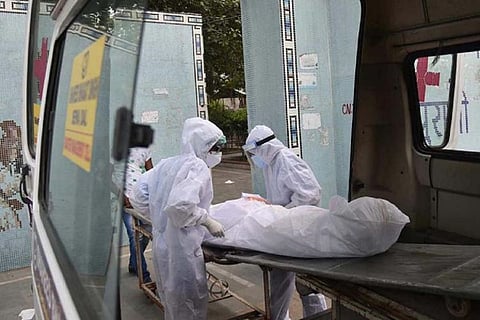

The case fatality ratio of COVID-19 patients in greater Bengaluru (rural and urban) is close to double, at a rate of 2.70, compared to the overall state tally of 1.60.
As per the COVID-19 medical bulletin issued on Sunday, while the case tally of Karnataka is at 13,190 and the death toll is 207, the combined death toll of the Bengaluru Rural and Urban districts is at 92 with a total of 3,419 cases among them.
This means 2.7 out of 100 or 2.7% persons testing positive for the novel coronavirus die in greater Bengaluru while for the rest of the state the fatality is 1.6 out of every 100 patients or 1.6%.
Further analysis of data by the State COVID-19 War Room states that the mortality rate of high risk patients (aged above 60 years or with comorbidities or both) in Karnataka is at 7.9%. At present, there are 1,415 patients undergoing treatment in the state.
Epidemiologist Dr Giridhar R Babu attached with the Public Health Foundation of India, who is working closely with the state government, said that Bengaluru has the third largest case fatality rate (CFR) in the country. This is worsening the picture of overall Karnataka in terms of COVID-19 indicators, he said.
Only Tumakuru (6.7), Bengaluru Rural (3.8) and Bidar (5.4) had worse CFR than Bengaluru Urban.
When it comes to COVID-19 deaths per million, Bengaluru fared second worst — Bidar was first at 9.80 deaths — at eight deaths per million.
“In the cases of both Udupi and Kalaburagi, medical colleges have shown how they can reduce mortality with the help of experts but Bengaluru, having the highest number of medical colleges in the state, has failed to realise its potential so far,” Dr Babu told TNM.
Dr Babu said that a tele-ICU (intensive care unit) protocol, devised by Dr Rangappa Pradeep and a team of doctors led by him, has maintained a case fatality rate of 0.54 in 13 districts across the state.
Explaining the high cases of deaths, Dr Pradeep Rangappa stated that two prime reasons have emerged on the basis of interim data inference.
One was the issue of patients reaching the hospitals late. The second was that, on average, patients from Bengaluru who succumbed to the disease had many more comorbidities, of which chronic kidney disease proved to be the most fatal.
Dr Trilok Chandra, senior IAS officer heading the COVID-19 Critical Care Support Committee said now a team of specialist doctors from Narayan Hrudayalaya run by prominent cardiologist Dr Devi Shetty will look after Bengaluru’s critical patients.
He added, “In Bidar, there is a specific issue. There is a lapse in surveillance as many patients are being underreported or reported late from private hospitals. In Bengaluru, we are trying to be proactive in all aspects now, but there is also a high number of cases with comorbidities.”
He said initially, it was thought not to use the tele-ICU facility for Bengaluru as it was deemed there would be enough specialists physically available.
Top sources in the state’s Health Department and the Bengaluru city administration have told TNM there have been lapses in recent days.
Dr CN Manjunath, Director of the Jayadeva Institute of Cardiovascular Sciences and Research, told TNM on Sunday that efforts are on to get things back on track in Bengaluru. He is also the nodal officer for COVID-19 testing in the state.
He said that there have been issues with the Bruhat Bengaluru Mahanagara Palike (BBMP) and the state government has instructed officials to hire more ambulances. There is a need for BBMP to mobilise more man power, he added.